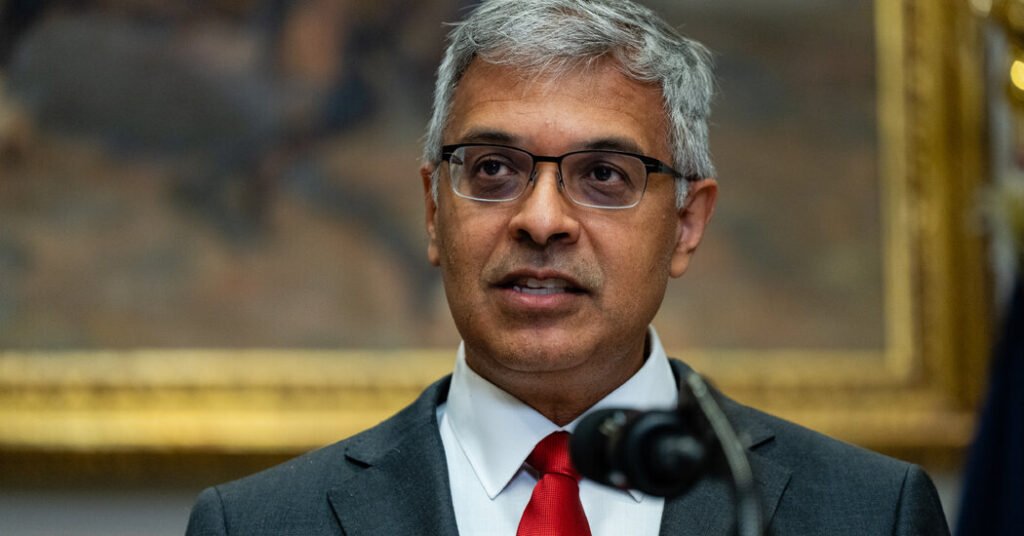In recent months, as the Trump administration tightened its grip on funding for medical research, staff and scientists at the National Institutes of Health (N.I.H.) often speculated about the level of control that Dr. Jay Bhattacharya, the agency’s director, truly had.
Elon Musk’s Department of Government Efficiency, known for its aggressive budget cuts, influenced decisions to cancel or postpone various research grants. Additionally, some initiatives suffered due to President Trump’s confrontations with universities concerning antisemitism. However, at a Senate committee meeting on Tuesday, rather than clarifying who really has power at the N.I.H., Dr. Bhattacharya refrained from taking responsibility for what could be described as one of the agency’s most tumultuous funding periods.
When questioned about his administration’s decision to halt grant payments to Northwestern University, Dr. Bhattacharya told the Senate Appropriations Committee, “These decisions were made before my tenure started.”
He consistently emphasized that the proposed N.I.H. budget cut of $18 billion—nearly 40 percent—was a “joint effort between Congress and the administration” and did not delve into specifics about how these reductions would impact the agency.
When asked about plans to limit funding for universities related to research overhead—the main cost-cutting strategy included in the administration’s 2026 budget proposal—Dr. Bhattacharya said, “I’d rather not discuss that,” citing ongoing legal matters.
Many committee Democrats expressed confusion over who was in charge at the agency.
Senator Tammy Baldwin from Wisconsin pressed Dr. Bhattacharya, asking, “Who is responsible for withholding this funding?” She highlighted that the N.I.H. had awarded billions of dollars less in grants than it had by this time last year. “Is it you? Is it DOGE? Is it O.M.B.?” she questioned, naming the Office of Management and Budget. “Who makes these decisions?”
Dr. Bhattacharya replied, “A variety of decisions contributed to some grant suspensions.” He mentioned his choice to distance the agency from what he called “politicized science,” a term he has previously used to refer to studies focused on diversity and equity issues, and noted that restrictions on funding at places like Harvard were made “in conjunction with the administration.”
After Dr. Bhattacharya denied any responsibility for halting research payments to Northwestern, Senator Dick Durbin from Illinois sharply responded.
An email from an N.I.H. official in mid-April, shortly after Dr. Bhattacharya’s confirmation, instructed staff not to issue grants to Northwestern and other institutions, and warned them not to disclose the reasons behind the funding freeze.
“The responsibility lies with you,” Mr. Durbin said to Dr. Bhattacharya. “Don’t shift the blame.”
The Trump administration’s plan for steep budget cuts next year faced backlash from senators across the political spectrum, including Republican Senator Susan Collins of Maine.
Collins labeled the proposed cuts “deeply troubling,” warning that they could delay or prevent crucial treatments and cures for diseases such as Alzheimer’s, cancer, and Type 1 diabetes. She cautioned that these plans might put the U.S. at a disadvantage compared to China.
In response, Dr. Bhattacharya affirmed that the N.I.H. remains dedicated to research on Alzheimer’s and other conditions, pledging to collaborate with lawmakers on addressing “the health needs of all Americans.”
He did indicate that there could be a potential agreement between the Trump administration and major universities that would restore their medical research funding, though he did not provide details on what it would entail. “I’m hopeful a resolution can be reached with the universities where their grants have been paused,” he stated.
Recently, the N.I.H. abruptly canceled over 1,300 grant awards and postponed funding for more than 1,000 additional projects. On Monday, a large group of N.I.H. staff signed a letter criticizing these actions as being influenced by personal biases and lacking input from scientific personnel, effectively silencing research on topics like health disparities, COVID-19, climate change impacts on health, and sexual health.
Dr. Bhattacharya stated on Tuesday that he had established a process for scientists to contest funding cuts, assuring that the agency would review these appeals within weeks.


